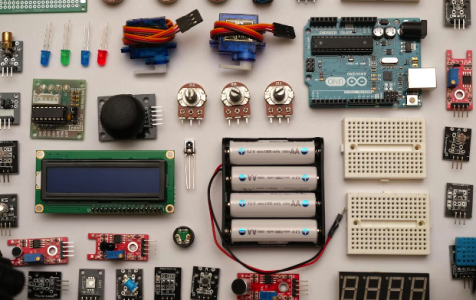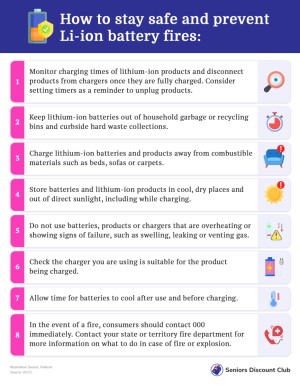Warnings issued over a common component in your gadgets
- Replies 5
They're in everything—from our phones and laptops to common household gadgets—those handy little power packs that keep our modern lives buzzing.
But lithium-ion batteries, while very convenient, come with some hair-raising risks many of us aren't aware of.
These batteries have been implicated in deadly fires, toxic smoke injuries, and even the destruction of homes, vehicles, and properties.
Lithium-ion (or Li-ion) batteries power most of our personal gadgets because they're lightweight, hold a lot of energy, and don't lose their charge as quickly as other battery types when not in use.
They allow us to have slim, portable devices with long battery life—very alluring features in the age of convenient technology! But what exactly makes them so risky?

According to the Australian Competition and Consumer Commission (ACCC), the danger lies in the potential for 'particularly catastrophic' failures due to the flammable and volatile liquid within these batteries.
To break it down further, the normal operation of a lithium-ion battery generates heat as a by-product. However, when there's an uncontrolled failure, the combination of this heat and the volatile liquid electrolyte solution can lead to a severe and self-sustaining fire.
The ACCC adds, 'These fires can be difficult to extinguish and may spontaneously reignite.'
What complicates matters further is that many lithium-ion battery packs contain multiple cells. If one cell fails, it can trigger a chain reaction, potentially resulting in a larger and more dangerous fire event.
The ACCC has reported that there has been a fatality linked to a fire caused by a faulty lithium-ion battery. In July, an electric bike exploded inside a residence in Sydney, leading to a fire that extensively damaged the house's ground floor and even destroyed a nearby vehicle.
Fourteen fire trucks were deployed, and firefighters had to stay overnight to ensure the lithium-ion battery didn't reignite. They also had to remove several other lithium-ion batteries from the scene to prevent further hazards.
Another incident took place at a hostel in Sydney. In this case, a lithium-ion battery exploded, causing a fireball to blaze through a hallway and injuring at least one guest.
The ACCC has expressed concern over these incidents, revealing that it has received 231 product safety reports on lithium-ion batteries in the past five years.
Approximately 89,000 products associated with these batteries have been recalled. Of these product recalls, 20 out of 23 were due to concerns about the batteries posing fire risks, overheating, or short-circuiting.
Catriona Lowe, Deputy Chair of the ACCC, said: 'We are concerned by increasing reports of lithium-ion battery fires resulting in property damage and serious injuries, including burns, chemical exposure and smoke inhalation.'
Data from hospitals has shed light on the dangers associated with Li-ion batteries.
According to information collected by the Victorian Injury Surveillance Unit from 2016 to 2022, there were 19 cases where individuals sought medical attention in emergency rooms due to injuries linked to Li-ion batteries.
In more than 70 per cent of these cases, the injuries consisted of burns, particularly on the wrists and hands, with approximately one-third of these patients requiring hospitalisation.
Although Li-ion batteries are generally dependable, the Australian Competition and Consumer Commission (ACCC) is cautioning that their demand is rising due to the increasing number of battery-powered devices in households. By 2026, it is projected that each Australian home will have around 33 such devices.
Now, you might be asking: why not opt for other types of batteries?
While other types of rechargeable batteries are available and commonly used, lithium-ion batteries stand out because they offer a combination of rapid charging, extended charge retention, and high power density, resulting in longer battery life in a smaller and more convenient package.
So, how can we use lithium-ion batteries more wisely? Always buy quality, legitimate batteries from reputable brands. It might seem counterproductive amid the high cost of living, but dodge cheap counterfeits. Use the right charger for each device, and avoid leaving devices charging unattended overnight.
Avoid exposing batteries to moisture, high temps or damage. Check devices for any swelling, leaking or hissing—clear warning signs of malfunction. And don't just chuck these batteries in your household rubbish! Recycle them safely to avoid any waste facility fires.

Lithium-ion batteries allow us to live our digital lives to the fullest. But with their risks in mind, a few savvy steps can help us harness their power safely.
Members, have you had any scary gadget battery experiences? Let us know in the comments below!
But lithium-ion batteries, while very convenient, come with some hair-raising risks many of us aren't aware of.
These batteries have been implicated in deadly fires, toxic smoke injuries, and even the destruction of homes, vehicles, and properties.
Lithium-ion (or Li-ion) batteries power most of our personal gadgets because they're lightweight, hold a lot of energy, and don't lose their charge as quickly as other battery types when not in use.
They allow us to have slim, portable devices with long battery life—very alluring features in the age of convenient technology! But what exactly makes them so risky?

Lithium-ion batteries are found in many household products, such as portable chargers, cordless vacuums, mobile phones, tablets, e-bikes and power tools. Credit: Unsplash/Robin Glauser.
According to the Australian Competition and Consumer Commission (ACCC), the danger lies in the potential for 'particularly catastrophic' failures due to the flammable and volatile liquid within these batteries.
To break it down further, the normal operation of a lithium-ion battery generates heat as a by-product. However, when there's an uncontrolled failure, the combination of this heat and the volatile liquid electrolyte solution can lead to a severe and self-sustaining fire.
The ACCC adds, 'These fires can be difficult to extinguish and may spontaneously reignite.'
What complicates matters further is that many lithium-ion battery packs contain multiple cells. If one cell fails, it can trigger a chain reaction, potentially resulting in a larger and more dangerous fire event.
The ACCC has reported that there has been a fatality linked to a fire caused by a faulty lithium-ion battery. In July, an electric bike exploded inside a residence in Sydney, leading to a fire that extensively damaged the house's ground floor and even destroyed a nearby vehicle.
Fourteen fire trucks were deployed, and firefighters had to stay overnight to ensure the lithium-ion battery didn't reignite. They also had to remove several other lithium-ion batteries from the scene to prevent further hazards.
Another incident took place at a hostel in Sydney. In this case, a lithium-ion battery exploded, causing a fireball to blaze through a hallway and injuring at least one guest.
The ACCC has expressed concern over these incidents, revealing that it has received 231 product safety reports on lithium-ion batteries in the past five years.
Approximately 89,000 products associated with these batteries have been recalled. Of these product recalls, 20 out of 23 were due to concerns about the batteries posing fire risks, overheating, or short-circuiting.
Catriona Lowe, Deputy Chair of the ACCC, said: 'We are concerned by increasing reports of lithium-ion battery fires resulting in property damage and serious injuries, including burns, chemical exposure and smoke inhalation.'
Data from hospitals has shed light on the dangers associated with Li-ion batteries.
According to information collected by the Victorian Injury Surveillance Unit from 2016 to 2022, there were 19 cases where individuals sought medical attention in emergency rooms due to injuries linked to Li-ion batteries.
In more than 70 per cent of these cases, the injuries consisted of burns, particularly on the wrists and hands, with approximately one-third of these patients requiring hospitalisation.
Although Li-ion batteries are generally dependable, the Australian Competition and Consumer Commission (ACCC) is cautioning that their demand is rising due to the increasing number of battery-powered devices in households. By 2026, it is projected that each Australian home will have around 33 such devices.
Now, you might be asking: why not opt for other types of batteries?
While other types of rechargeable batteries are available and commonly used, lithium-ion batteries stand out because they offer a combination of rapid charging, extended charge retention, and high power density, resulting in longer battery life in a smaller and more convenient package.
So, how can we use lithium-ion batteries more wisely? Always buy quality, legitimate batteries from reputable brands. It might seem counterproductive amid the high cost of living, but dodge cheap counterfeits. Use the right charger for each device, and avoid leaving devices charging unattended overnight.
Avoid exposing batteries to moisture, high temps or damage. Check devices for any swelling, leaking or hissing—clear warning signs of malfunction. And don't just chuck these batteries in your household rubbish! Recycle them safely to avoid any waste facility fires.
Key Takeaways
- The Australian Competition and Consumer Commission (ACCC) has warned consumers about the risk of fires from lithium-ion batteries found in many household electronics.
- The ACCC revealed it received 231 product safety reports on lithium-ion batteries in the last five years, with an estimated 89,000 products recalled due to fire risk or overheating.
- The ACCC advised consumers to use safe charging practices, buy high-quality batteries, keep them away from heat and moisture, and dispose of them safely.
- The ACCC expressed concern over the increasing demand for lithium-ion batteries as our lives become more reliant on technology, predicting that by 2026, an average Australian household will have 33 devices powered by lithium-ion batteries.
Lithium-ion batteries allow us to live our digital lives to the fullest. But with their risks in mind, a few savvy steps can help us harness their power safely.
Members, have you had any scary gadget battery experiences? Let us know in the comments below!








